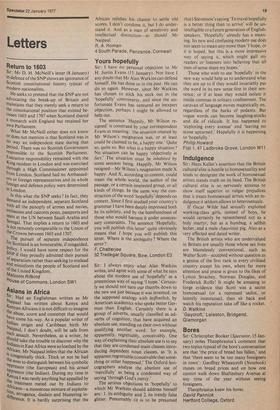Yours hopefully
Sir: I have no personal objection to Mr H. Justin Evans (15 January). Nor have I any doubt that Mr Alan Watkins can defend himself. He has done so in the past. He can do so again. However, since Mr Watkins has chosen to stick his neck out in the 'hopefully' controversy, and since the unfortunate Evans has ventured an inexpert objection, perhaps I might be allowed to help out.
The sentence 'Happily, Mr Wilson resigned' is construed by your correspondent Evans as meaning : 'the situation created by Mr Wilson's resignation was, or at least could be claimed to be, a happy one.' Quite so, quite so. But what is a happy situation ? No situation can be happy 'objectively in fact.' The situation must be inhabited by some sentient being. Happily, Mr Wilson resigned—Mr Wilson's resignation made X happy. And X, according to context, could mean the whole world, the author of the passage, or a certain interested group, or all kinds of things. In the same way the construction of the word 'hopefully' depends on context. Since I first studied your country's grammar I have been deeply impressed both by its subtlety, and by the hamfistedness of those who would harness it under unnecessary constraints. The sentence 'Hopefully, you will publish this letter' quite obviously means that I hope you will publish this letter. Where is the ambiguity? Where the error?
F. Chatterjee 32 Tredegar Square, Bow, London E3
Sir: I always enjoy what Alan Watkins writes, and agree with some of what he says about the modern use of 'hopefully' as a pretentious way of saying 'I hope.' Certainly we should not turn our thumbs down to the new use just because it was invented, on the supposed analogy with hoffentlich, by American academics who spoke better German than English, Certainly there is a group of adverbs, usually classified as adverbs of cognition, that have acquired an absolute use, standing on their own without qualifying another word: for example, apparently, regrettably, conceivably. One way of explaining their absolute use is to say that they are condensed main clauses introducing dependent noun clauses, as 'It is apparent/regrettable/conceivable that something or other happened.' The Oxford lexicographers analyse the absolute use of 'mercifully' as being a condensed way of saying 'through God's mercy.'
The serious objections to 'hopefully' to which Mr Watkins should address himself are: I. its ambiguity and 2. its trendy false glitter. Presumably (it is to be presumed that) Stevenson's saying `To travel hopefully is a better thing than to arrive' will be unintelligible to a future generation of Englishspeakers. 'Hopefully' already has a meaning. Its new and confusing modern use does not seem to mean any more than 'I hope, or it is hoped, but this is a more impressive way of saying it, which might gull my readers or listeners into believing that all men of sense share my hopes.'
Those who wish to use 'hopefully' in the new way would help us to understand what they are up to if they would invariably put the word in its new sense first in their sentence; or if at least they would isolate it inside commas in solitary confinement. The caravan of language moves majestically on, regardless of the barks of pedants. But vogue words can become laughing-stocks and die of ridicule. It has happened to 'exploring every avenue' and 'leaving no stone upturned.' Hopefully it is happening to 'hopefully.'
Philip Howard Flat 1,47 Ladbroke Grove, London W11


































 Previous page
Previous page